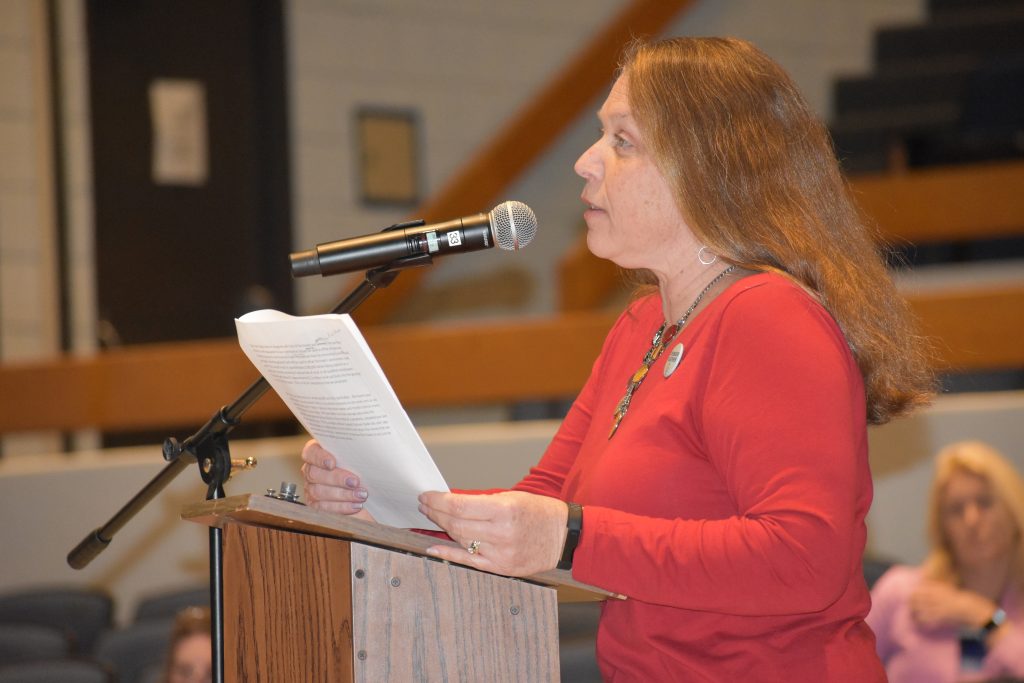Wearing #RedForEd, teachers, paraeducators, custodians, nurses, and other unionized school staff turned out in force at the Haddam-Killingworth Board of Education meeting last night. Their demand? That hundreds of thousands of dollars they contributed to a now-discontinued health insurance reserve fund be returned to them—instead of going into the board’s general fund.
“Our school employees are dedicated to their students and their work, and each person contributed to this health insurance fund in good faith,” said Haddam Killingworth Education Association President Robin Duffield. “Now that the fund is deactivated, teachers and staff deserve to have their fair share returned to them.”
That was the legal opinion put forth by CEA attorneys—a proposal supported not only by teachers and school staff but also members of the community.
With more 100 than teachers, staff, parents, and children in the auditorium behind her, Duffield explained, “Members of the audience are wearing red tonight, because we are in the red—our paychecks, that is. The decision that the board is making directly affects employees here tonight, and many others—the very people who throughout the pandemic have dedicated themselves to keeping our schools open and children learning—and it’s a matter of fairness and respect for everyone in our district.”
Educators and their supporters waved signs that read, “Do the Right Thing,” “Fair Is Fair,” and “Thank You, Teachers.”

Haddam Killingworth Education Association President Robin Duffield (front, in red) with supporters asking for a fair deal for teachers and school staff.
Actions louder than words
The self-insurance reserve fund in question was built in part by the contributions of school employees to cover the contractual obligations of health insurance costs. Approximately 20 percent of the $1.9 million fund—totaling nearly $380,000—came from school employee contributions.
After a change in the Regional School District 17 insurance plan—from a self-insured plan to a state partnership plan—the board of education sought a legal opinion on how to dissolve the reserve fund. The board’s legal counsel recommended using the entire balance, including the portion contributed by teachers and staff, to offset town tax burdens.
School library media coordinator Lou Hosking, who serves as president of the Support Services Association representing the district’s paraeducators, secretaries, library media coordinators, and cafeteria staff, urged board members to support CEA’s proposal.
That proposal, she explained, would apply school employees’ share of the fund to a premium holiday—approximately six pay periods of insurance premium relief—for all qualified employees.
“Why would it not be appropriate to distribute the funds attributable to employee contributions to the employees—not in the form of cash payouts, but by relaxing their existing contractual premium obligations by appropriate measure?” Hosking asked.

Duffield urges board members to back up their praise for teachers with real action.
“That seems like a very fair compromise,” Duffield said, noting that the bulk of the deactivated fund—$1.32 million—would go to the general fund to offset taxes.
The board, however, voted to transfer the entire fund—including what teachers and school staff paid in—to the general fund, with the stipulation that the money be used to offset the 2022-2023 board of education budget.
“Every year, teachers spend north of $1,000 of our own earnings on classroom supplies and other essential materials to make our classroom environments as friendly and as comfortable for students to learn in as possible,” said Duffield. “We learned how to run a district remotely in one week and opened back up for hybrid instruction weeks or even months before many other districts in the state. We hear talk about our amazing staff and their dedication. Sometimes it’s necessary for words of thanks to be backed up by real actions.”







